Top 10 Traditional Turkish Dishes Suitable for Vegans
Turkish cuisine is one of the richest and most diverse cuisines in the world. Although meat and dairy products are used extensively, there are also countless traditional dishes based on plant-based ingredients that are suitable for vegans. Vegetable dishes, legume dishes and olive oil-based dishes, which have been consumed for centuries in different regions of Turkey, offer both a delicious and nutritious alternative. Discovering vegan-friendly Turkish dishes opens the door to both a cultural experience and healthy eating. So, what are the best Turkish dishes suitable for vegans? Here are the top 10 traditional Turkish dishes for vegans 👇
1. Çiğköfte
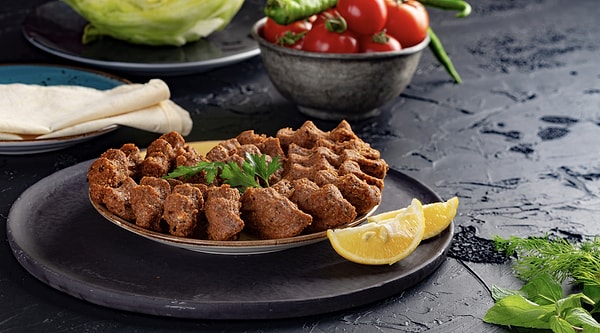
Çiğköfte are one of the most well-known delicacies of the Southeast Anatolian cuisine. Although raw meat is used in the traditional version, completely meat-free, vegan Çiğköftes have become popular today. Vegan Çiğköftes are prepared with fine bulgur wheat, onion, garlic, isot (Urfa pepper), tomato and pepper paste, pomegranate molasses, olive oil and various spices. When kneading the bulgur, it is necessary to knead for a long time for the flavour of the mixture to settle. Serving çiğköfte with lettuce leaves or lavash makes for a practical and filling meal. This dish is one of the top choices for vegans among street foods.
2. Olive Oil Stuffed Vegetables and Dolma
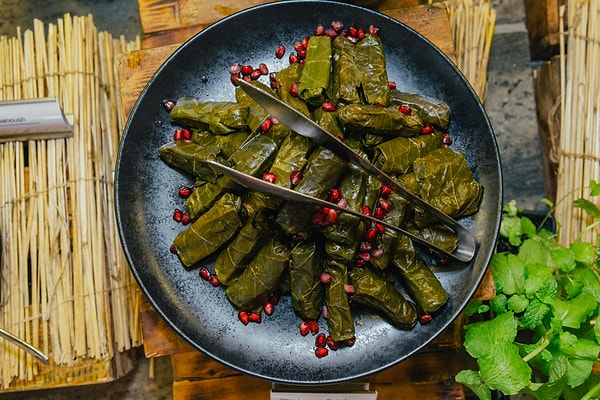
In Turkish cuisine, olive oil dishes showcase the seasonal flavours of vegetables in their most natural form. Dolmas made with cabbage, grape leaves, courgette or peppers are a great alternative for vegans. The filling usually consists of rice, fine bulgur, onion, parsley, dill and spices. Olive oil both adds flavour and keeps the dish light. Dolmas can also be eaten cold, making them a particularly popular choice in summer. Olive oil-based stuffed vegetables and rolls are both filling and rich in vitamins.
3. Mücver
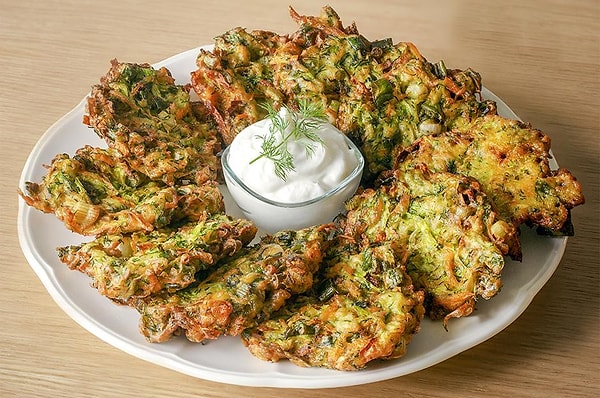
Mücver is particularly known as courgette mücver. While eggs are used as a binding agent in traditional recipes, plant-based binders such as flour and water or chickpea flour can be used in the vegan version. Courgettes, carrots, potatoes and dill are grated, mixed with spices and then fried or baked. It can be served with a tahini sauce instead of a light yoghurt sauce. Mücver is a practical, tasty and vitamin-rich appetiser or main course.
4. Mixed Vegetable Stew
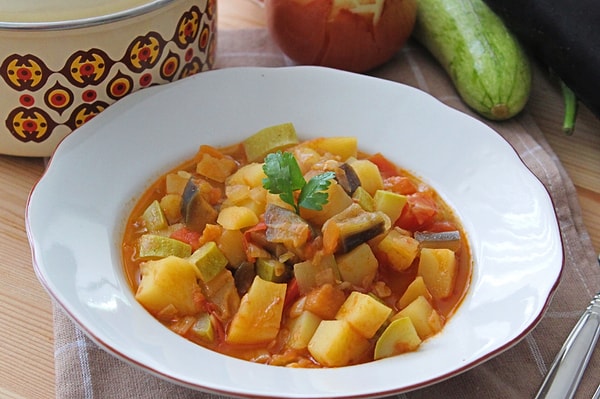
Mixed vegetable stew is one of the most basic dishes of Anatolian cuisine and is essentially a vegetable feast. Seasonal vegetables such as aubergine, courgette, tomato, pepper, carrot, and potato are cooked in a pot with olive oil. Spices such as black pepper, chilli flakes, cumin, and parsley can be used. Türlü is a filling and nutritious option for vegans. In addition to olive oil-based türlü, tomato sauce-based baked türlü is also commonly found on modern tables.
5. Menemen (Egg-free)
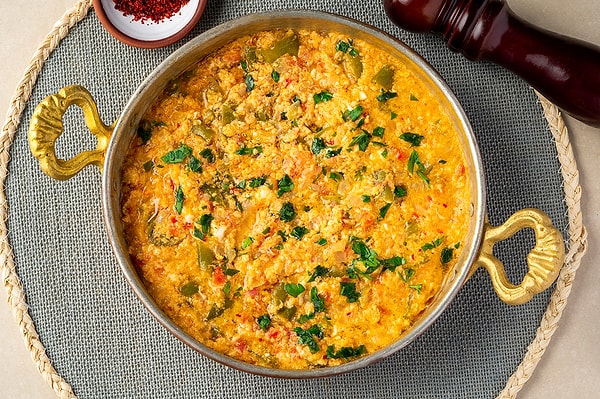
Menemen is traditionally an indispensable part of breakfast. Eggs are normally added to the mixture prepared with tomatoes, green peppers, onions and spices. However, in vegan menemen recipes, alternative binders such as tofu, chickpea flour or breadcrumbs can be used. Sautéing the tomatoes and peppers and then mixing them together makes menemen both a tasty and filling option. Served with fresh bread, it is an excellent vegan alternative for breakfast.
6. Kısır

Kısır is a bulgur salad commonly consumed in the Southeast and Central Anatolia regions. It is prepared with fine bulgur, tomatoes, cucumbers, fresh onions, parsley, mint, and pepper paste. Pomegranate molasses and lemon juice are the main ingredients that balance the flavour of kısır. Mixed with olive oil and fresh vegetables, kısır offers a light and healthy meal option. It can be consumed as a refreshing salad during the summer months.
7. Lentil Patties
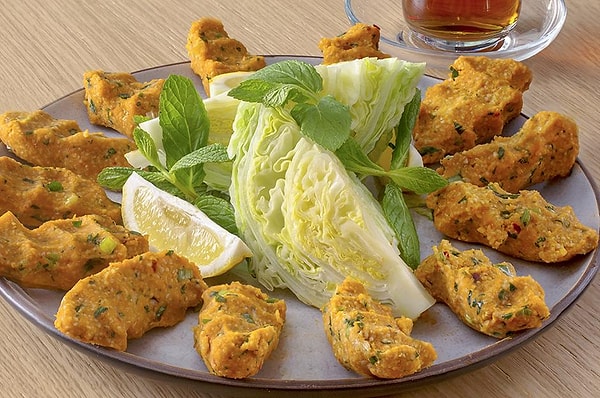
Lentil patties are prepared with red lentils and fine bulgur. The mixture, combined with onion, garlic, spices, and herbs, is shaped by hand into patties. Lentil patties are a protein-rich and filling dish. They are particularly suitable for lunch or as a snack. An ideal option for vegans, they are commonly found both at home and in restaurants.
8. Imam Bayıldı
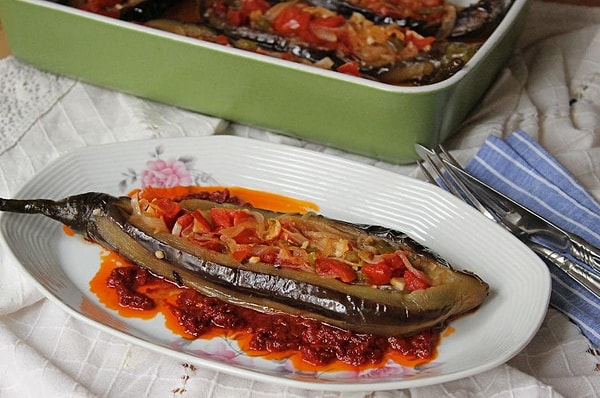
Imam Bayıldı is a classic of Ottoman cuisine and is a completely vegan dish. Aubergines are cut in half, hollowed out, and stuffed with onion, garlic, tomato, parsley, and olive oil. Cooked slowly in the oven or in a pot, Imam Bayıldı maximises its flavour as it cooks in its own juices and olive oil. Served cold, it makes an excellent main course alternative for summer meals.
9. Legume Dishes
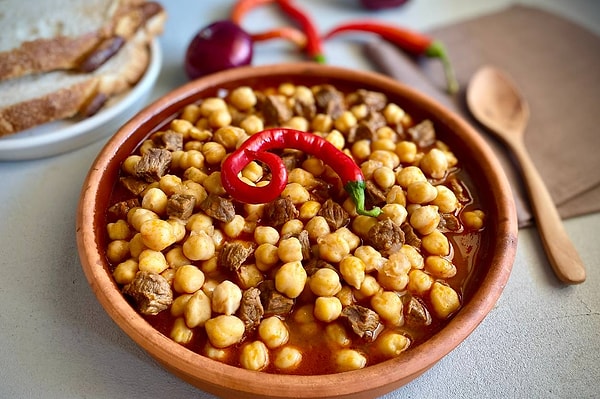
Turkish cuisine is extremely rich in legume dishes. Dishes prepared with chickpeas, dried beans, broad beans, and green lentils are rich in protein and fibre. Dried bean dishes or chickpea dishes are usually prepared with olive oil and spices, making them suitable for a vegan diet. These dishes are both filling and economical options and are often among the main course preferences of vegans.
10. Zerde

Zerde is a traditional Turkish dessert and is completely vegan. It is prepared with rice, sugar, water, rose water, and saffron. The pistachios and pomegranate seeds sprinkled on top add both colour and flavour to the dessert. Since no milk or animal products are used, it can be safely consumed by vegans. Especially served on special occasions and holidays, zerde adorns tables both visually and in terms of taste.
Keşfet ile ziyaret ettiğin tüm kategorileri tek akışta gör!

Send Comment